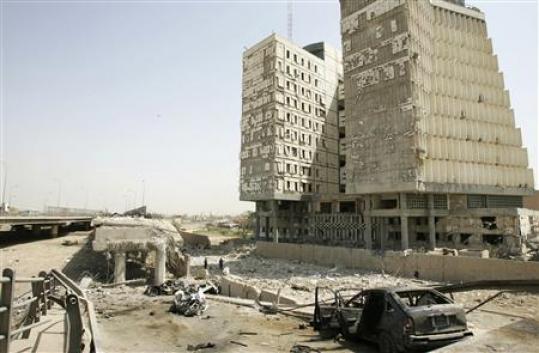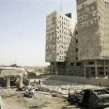
Iraqi Insurgents Take the Offensive as Parliamentary Elections Approach
Publication: Terrorism Monitor Volume: 7 Issue: 28
By:

Multiple bombings targeting Iraq’s governmental ministries just outside central Baghdad’s fortified Green Zone on August 19 left 95 people killed and over 600 others wounded, marking the single deadliest day in 18 months. The event forced the Iraqi government to reevaluate the country’s security sector, as the attacks demonstrated the inadequacies of the Iraqi Security Forces (ISF) and the efficacy insurgents maintain in carrying out high profile and coordinated operations. As Iraqi parliamentary elections approach in January 2010, insurgents and rival political factions will likely mount an aggressive campaign to destabilize the political process and undermine the central government’s credibility in pacifying Iraq sans U.S. military presence.
The Instability of the Election Season
Today, Iraqi Prime Minister Nuri al-Maliki’s political strategy concerning the parliamentary election is directed towards retaining his post as Prime Minister. His campaign is grounded in two critical goals in the eyes of the Iraqi public: 1) Bringing security and stability to Iraq in order to facilitate economic growth and reconstruction; 2) Solidifying his image as the national leader by achieving Iraq’s sovereignty and ending the U.S. military occupation.
For much of al-Maliki’s tenure, however, these two goals have been posed in zero-sum terms; security was best achieved when U.S. forces engaged the local population and patrolled Iraqi streets. The security improvement resulting from the Awakening Movement and the implementation of the 2007 U.S. counterinsurgency strategy allowed al-Maliki to consolidate and centralize his authority at the expense of rival factions and former political allies, like firebrand Shi’a cleric Muqtada al-Sadr. Al-Maliki’s 2008 demonstration of assertiveness towards his U.S. counterparts by demanding explicit deadlines be stipulated in the Status of Forces Agreement (SOFA) reflected his growing autonomy and influence on the domestic scene. His political rationale for requiring U.S. combat forces to disengage from Iraqi cities only six months after the SOFA was implemented was to demonstrate to the Iraqi public his sovereignty bona fides, effectively broadening his popularity in advance of elections.
But the handover of the urban security profile to the ISF comes at the same time as three political proceedings that carry significant security concerns; the parliamentary elections, a national referendum held the same day on the continued implementation of the SOFA, and the first post-Saddam census. If the Iraqi people reject the SOFA in the referendum, U.S. forces may be required to leave Iraq a year earlier than the December 2011 deadline currently specified. Political sensitivity and concerns over destabilization have allowed the census to be continually delayed by Baghdad (Aswat al-Iraq, August 31). It is now scheduled to take place after August 2010 – the time when President Barack Obama intends to withdraw all U.S. combat forces. Because of their great potential in shaping the future distribution of power and political structure inside Iraq, all three proceedings will risk the possibility that Iraqi politics may revert back to civil war-politics, when political factions engaged one another via militias.
There are indications that al-Maliki will face-off against the Shi’a political parties in the next round of elections. In the 2005 parliamentary elections, major Shi’a Islamic parties ran on a single powerhouse political list – the United Iraqi Alliance (UIA) – in order to guarantee their dominant position in Iraq’s Council of Representatives. On August 24, in an effort to reconstitute a winning Shi’a coalition for the upcoming election, the Iraqi National Alliance (INA) was announced, consisting of former UIA participants like the Islamic Supreme Council of Iraq (ISCI), the Sadrists, and the Badr Organization, among others (al-Jazeera, August 24). Al-Maliki and his Dawa Party have refused to enter into the INA because the alliance refused to guarantee him the office of Prime Minister (Al-Sumaria TV, August 25). Moreover, ISCI had dominated the former Shi’a bloc while advocating a federal administrative structure which is now inconsistent with al-Maliki’s political agenda for achieving a strong central government. The Prime Minister has decided instead to build a rival political list, consisting of a broad-based national coalition of Sunni nationalists and southern Shi’a tribes.
These conflicting agendas are concerning in that they may lead to Shi’a on Shi’a violence ahead of the election. Instead of the old ISCI-Sadrist rivalry that characterized southern Iraq, members of the INA may attempt to sabotage al-Maliki’s political campaign by undermining his ability to provide security. As suggested by the comments of Abu Hamza al-Masri, a member of Muqtada al-Sadr’s staff in Basra; “The party and sectarian behavior of al-Maliki has not ended, but on the contrary, has been renewed” (Niqash.org, August 19).
The Insurgent Rationale
Before the U.S. military switched from campaigns focusing on territory to a population-protection counterinsurgency strategy, the goal for many insurgents was to hold and defend territory. But the loss of territorial footing for al-Qaeda in Iraq (AQI), Sunni insurgents, and Shi’a militiamen has altered their strategic engagement vis-à-vis their adversaries from a partly defensive posture to a completely offensive posture. Without the option of defense, the battleground for insurgents becomes less of a resistance based on territorial fronts and more of an asymmetrical engagement that is entirely focused on offensive attacks.
Insurgents hope to undermine the Iraqi political process, reconciliation efforts, and trust in government in order to bring about the anarchical conditions necessary for their organizational survival and the achievement of their objectives. Because of their loss of capability and territory, AQI and others are likely to make better use of their existing resources and adopt cautious assessments of their operations.
Moreover, because there is no defensive line to hold, insurgents can now decide on their own schedule when to be active members of the insurgency. This was the case during al-Maliki’s spring 2008 Mosul offensive called “Lion’s Roar.” Many Iraqi military commanders were disappointed with the lack of resistance as they had hoped for a decisive battle against the remaining remnants of AQI. As one report indicated, “The lack of significant resistance among the hardened fighters who had been operating in Mosul suggested the insurgency was offering Maliki and his American backers a message of their own: ‘We fight on our terms, not yours’” (Azzaman, June 14).
With the option of engaging the ISF on an urban battlefield removed, insurgents are forced to operate in a more discrete manner. Political assassinations have remained an efficient tool for them and will likely gain popularity as they adapt their posture in advance of the election (Azzaman, June 14). High-profile bombings are also another tool insurgents may come to rely heavily on in the coming months. This has been the primary strategy executed by AQI insurgents in the Mosul area, as recognized by U.S. Major General Robert Caslen. “They recognize what they need to do is the high profile attacks and go after the local nationals in order to entice the sectarian violence." (VOA, August 11).
The upcoming election offers a powerful forum where insurgent attacks could provide the greatest political damage to the Iraq government, especially against al-Maliki’s prospects for retaining office. With U.S. combat forces now disengaged from ISF missions in Iraq’s urban areas, the trust and confidence the Iraqi people have in their security forces will be challenged by insurgents. Al-Maliki was aware of this challenge to his political credibility after the August 19 bombings, saying: “I would like to assure the Iraqi people that the security forces are still capable of continuing the battle and achieving more victories” (AP, August 22).
Regional Conflicts of Interest
Another major concern for Iraq in the context of the parliamentary election is the role of the country’s neighbors. What happens in Iraq concerns many surrounding political actors, especially when considering the changing dynamics of the regional balance of power. For example, Iraq’s maturing military is making advances in its capabilities and weapons systems through the U.S. foreign military sales program. The Strategic Framework Agreement, signed as a separate document alongside the SOFA, fosters a long-term strategic partnership with the United States – effectively nurturing Baghdad as a future power player in the region.
Some nearby states, however, may feel uneasy about Iraq’s increasing military capability. Uncertainty prevails in the region over the direction Baghdad is actually heading – federal and democratic or a consolidated central government. Moreover, Sunni Arab leaders are not sure whether a Shi`a Iraq would ally itself with Iran.
Such security concerns give the results of the upcoming Iraqi election a strategic interest for outside states. Neighboring governments have meddled and backed political lists in the past, as was the case in the 2005 parliamentary elections. Iran may now be concerned about al-Maliki’s agenda as he plans to achieve a broad-based national coalition with Sunni Arab nationalists at the expense of closer Iranian allies like the ISCI, the Sadrists, and the Badr Organization. Activity inside Iraq by Iran’s Revolutionary Guards appears directed towards ensuring a pro-Iranian Shi’a government in Baghdad.
Recent discoveries of new weapons caches in southern Iraq suggest that Shi’a militias are stockpiling arms in connection with the upcoming parliamentary elections (Arab Times, August 31). Many of the manufacturing dates on the weapons (grenade launchers, silencers, sniper rifles, automatic weapons, and explosives) were as recent as 2008, with Persian inscriptions found on the rockets. The findings suggest that many of the weapons arrived in Iraq after al-Maliki’s spring 2008 crackdown on the Shi’a militias that uprooted al-Sadr’s Jaysh al-Mahdi group from its territorial strongholds. According to Iraqi police, investigations now hint that Shi’a militias opposed to al-Maliki are recruiting fighters to undermine his electoral prospects. As one high-ranking police officer described it; “Their aims are to destroy the image of the prime minister and pull the carpet from under his feet by making it impossible for him to claim he has succeeded in improving security” (Reuters, September 1).
Surrounding Sunni Arab states may also feel compelled to undermine al-Maliki’s electoral advantages ahead of the parliamentary election, as his rhetoric and consolidation of power has been of some concern to them lately. In reacting to an upsurge of violence targeting low-income Shi`a neighborhoods in June 2009, al-Maliki pointed the finger toward Arab governments for fueling the instability: “There are states which are silent on fatwas (Islamic decrees) urging killings and branding others [as] infidels.” (Azzaman, June 27). Although al-Maliki did not mention the states he perceived responsible, it is likely his remarks were at least partly directed toward Saudi Arabia.
Suspected involvement of Syrian intelligence officials for the August 19 bombings in Baghdad has suggested conflicting interests exist between al-Maliki’s re-election campaign and some factions in Syria. Iraq believes it has collected evidence that implicates AQI, Syrian intelligence officials and Iraqi Ba’athists based in Syria in the attacks. According to al-Maliki, “Confessions by conductors of this terrorist act revealed that the operation is not internally made but carried out by [foreign] countries” (Kurdish Globe, August 29). Both Damascus and Baghdad have recalled their ambassadors in a dispute over the bombings.
Conclusion
Regardless of the security gains made in Iraq, the country is still riddled with poor institutions, ethnic and tribal rivalries and an absence of genuine reconciliation efforts. With the gradual disengagement of U.S. combat forces, the ISF will likely be tested on their capability and integrity as a non-sectarian institution that is dedicated to the protection of all Iraqis. The trust and confidence of the Iraqi people in the ISF is essential for continuing a counterinsurgency campaign. Iraqi insurgents and terrorists alike are no longer carrying out operations intended to seize territory inside Iraq. Rather their short-term goals are now concentrated on damaging the central government’s credibility, fomenting sectarian strife between the different ethnic segments of society and promoting the perception that the ISF is inadequate to protect Iraqi neighborhoods. If successful, these goals will render any counterinsurgency strategy ineffective, as collaboration and information sharing between the local population and the ISF become increasingly difficult to achieve.





